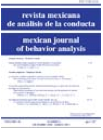HERENCIA Y AMBIENTE EN EL CONDUCTISMO SKINNERIANO
Contenido principal del artículo
Resumen
El análisis del comportamiento se ha caracterizado por ponerse exclusivamente del lado del ambiente en la dicotomía herencia-ambiente. Sin embargo, un examen del conductismo Skinneriano revela que el conductismo reconoce ambas, a la herencia y al ambiente como determinantes del comportamiento. Skinner rechazó las explicaciones del comportamiento innato y adquirido que se basan en los instintos y en los hábitos y propuso en cambio que tanto el comportamiento innato como el adquirido son función de la selección por consecuencias--filogenéticas y ontogenéticas. Skinner distinguió estas contingencias de tres maneras en base a: (a> su relación temporal con el comportamiento, (b) sus consecuencias, y (c) lo que seleccionan. Las contingencias filogenétícas corresponden a la historia evolutiva de las especies, logran sus efectos a través de la supervivencia de éstas y unen el pasado y el presente a través de los genes. Por otra parte, las contingencias ontogenéticas contribuyen a la historia del comportamiento de un individuo, logran sus efectos a través del reforzamiento de la conducta y unifican el pasado y el presente a través de factores biológicos no genéticos. Las variables de las cuales el comportamiento innato y adquirido es función--las contingencias fílogenétícas y ontogenéticas--representan la versión de Skinner en la dicotomía herencia-ambiente.


